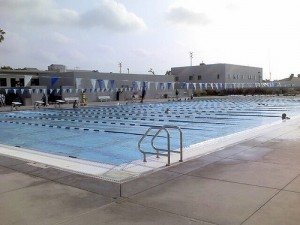 The first practice is kind of like the first day of school, both exciting and a little scary for both swimmers and parents. It can be worse if you have no experience with swimming and you have no idea what to expect. While every team is different and you should find out exact details from your team, I’d like to share some general information and ideas to get you started.
The first practice is kind of like the first day of school, both exciting and a little scary for both swimmers and parents. It can be worse if you have no experience with swimming and you have no idea what to expect. While every team is different and you should find out exact details from your team, I’d like to share some general information and ideas to get you started.Practice Groups:
Most larger teams have multiple practice groups that practice a different times and sometimes even different locations. Smaller teams sometimes practice all together but at very least the coach will divide them into groups by lane. Teams define their practice groups in a variety of ways. Sometimes it’s by age and other times it is by ability levels. Age group practices are simple enough, if you are 11, you swim with other 11 year olds. What’s great about this is that your swimmer gets to swim with his or her peers all the time, potential relays can practice together, social groups are a little easier, and so forth. The down side can be that there is a huge range of ability levels in any age group. It can be difficult to have kids capable of breaking a minute in the 100 free swimming in the same group as someone who swims 1:30. Thirty seconds might not seem like a lot until you see kids lapping each other and swimming over each other. So even in age group practices you’ll probably see at least some division of ability into different lanes. Other teams group kids by ability level. Often they will have certain time standards and/or require swimmers to be able to perform certain practice sets to qualify for a practice group. In this case you may see 9 year olds swimming with teenagers. The advantage is the kids get to swim with kids who can push them in practice. Though it can sometime be tough to be the oldest or youngest in the group socially speaking. Whatever method your team uses it is important to find out what group your swimmer belongs in and attend only those practices until told otherwise.
What should we bring?
- Practice suit – Not your team suit, these should only be worn at meets or they will wear out much too fast. Also, boys usually wear jammers and some older boys wear briefs (usually briefs start in high school), if they show up to practice in swim trunks like you see on the beach they will probably feel out of place. Plus those cause a lot of drag in the water, and are hard to keep up so your sons will likely quickly rebel against those. If you need to pick up a practice suit check out your local competitive swimming apparel store, most teams associate themselves with one who might even give you a discount. or there are lots of online stores available. Swimoutlet.com is my personal favorite.
- Water Bottle – believe it or not swimmers sweat too..they’ll need to drink. (Never bring glass on a pool deck though…plastic only!)
- Goggles – good ones like speedo, TYR, etc..brands are best (Good practice goggles cost in the $12-25 range).The cheapo ones you get at Walmart by the inflatable pools won’t really cut it long term. My sons prefer Speedo’s Vanquisher 2 Goggles. If you are going to swim outside make sure to get the tinted ones so the sun doesn’t blind you during backstroke.
- Towel
- Equipment – many teams require some type of equipment such as fins, hand paddles, kick boards, pull buoy, snorkel, etc..these too can be purchased at any competitive swim shop including SwimOutlet.com. If you are not sure what you need, ask your coach.
- Mesh equipment bag – great for transporting equipment.
- Swim Bag- This holds extra suits, clothes etc… This can be any type of gym bag, though most swimmers get bags specifically designed for swimmers needs.
- Warm clothes & hat to go home in – Important as the weather gets cooler, summer teams don’t have to worry about the hat so much.
- Sun Screen: For those lucky enough to be outside soaking up the sun.
Be sure to put your name on everything…including both flippers, both paddles, bags, and suits. Trust me, if it is not attached to your child at all times they will forget it at some point.
Should I stay?
If your team allows parents to stay at practice the big question becomes…should I stay…or should I live up an hour or two of free time? Assuming your team allows parents to stick around here is my recommendation. If you have a young swimmer, yes you should probably stay…at least for the first few practices until you see how your child reacts to the practices. My youngest swimmer used to need his father or I to stay to once in awhile give him that parental evil eye stare to remind him to behave. Yes, I’d stand in the observation area of the YMCA and give him the mom stare of doom through the window until he felt my eyes burning a hole through the back of his head. It worked better than you’d think. Or other times he’d get the smile and nod to let him know he was doing great. Eventually he learned to behave himself well enough that we could trust him not to get in too much trouble, so we only went to practices sporadically from then on.
With older swimmers it is up to you. Some parents like to watch practice, other parents like to enjoy their free time in other ways. I do always recommend you at least go in with them and verify the coach is there….in my many years as a swim mom there have been a few times that a coach has had an emergency and didn’t show-up to practice. Coaches are human too, their cars can break down in the middle of the highway, they have a family members rushed to the ER, and sometimes they just mix up their schedule. Or it’s possible practice was cancelled and you somehow missed the announcement. So, again, I always like to at least go in and verify the coach is there, and my swimmer is ready to go.
“Isn’t this abusive?!”
One of my early years with my current team I was sitting and watching an upper level practice and it was already at least a couple of months into the season. A dad brought his swimmer to practice for the first time (mom usually did it)…and I remember he stood watching practice for about a half an hour or so and his eyes just kept getting wider and wider, then he started looking at other parents trying to find any inkling that we were thinking the same thing he was. When he found no such confirmation, he finally asked…”Is this how practices always are?!” And the parents replied that it was a fairly standard practice…and the dad marveled…”Don’t they ever stop swimming?” And the general consensus of the other parents was… it’s swim practice, what else would they do? So the dad watched a bit longer…and finally declared “Isn’t this abusive?!” And the rest of the parents laughed, and I said “Only if you try to make us swim that work out…look at their faces…the kids love it” Dad called his wife who apparently told him to be quiet and stop embarrassing her, it was normal for the kids to swim that much. That poor dad…I’ll never forget the look on his face.
Bottom line is the kids work hard at practice. They swim a set, have a bit of rest then swim another set, and again, and again until practice is over. Rest is built into the sets and some fun stuff too like races, relays, and the occasional game or treat…but for the most part the kids will swim and swim some more. It is amazing what these kids can do. You don’t need to worry though…if you’ve chosen your team wisely, you can trust the coaches to know what they are doing. Good coaches know just how hard to push the kids. If they see a swimmer struggling, they will modify the workout, if it continues they may recommend a different practice group or at least a different lane with swimmers of more similar ability. Good coaches never push a swimmer harder than they should. They are gentle with the young/less experienced ones, yet push them enough slowly over time so that they can achieve their goals. At the upper levels the coaches will teach your swimmers how to train hard and really push themselves so they can be faster than they thought they could be. So, if the first practice you ever saw was a mid season,upper level practice…yeah it might seem like a bit much…but these are swimmers, it is what they do. On the bright side, during the season there are no arguments about bedtime. Although you may find you need to budget a bit more for groceries, swimming is hungry work!
Practice Dos & Don’ts
Do:
- Get your swimmer there early enough that they can change, get their equipment ready, and get on deck before practice starts.
- Watch at least some of the practice if your team allows it.
- Talk to other parents, most swim parents are awesome people.
- Make sure you are there 10 minutes before practice ends to pick your child up. It is not the coach’s job to babysit for late parents.
Do NOT:
- Coach your swimmer. You pay a lot of money to have your children coached by a professional. Let them do their jobs, you can sit back and relax… and perhaps contemplate the mystery of how a coach can get your kid to do grueling sets of butterfly, but you can’t get him to put his dirty socks in a laundry basket. (Course that may just be me.)
- Talk to the coach during practice unless it is an emergency (your child got sick or hurt during practice, you noticed unsafe behaviors that the coach missed, etc…) If you need to talk to the coach it is usually better to do it before or after practice, or send and email.
- Talk loudly with other parents in the area the coaches are working with the swimmers. Feel free to chat, just don’t disrupt practice.
- Go to practice groups (higher or lower) that your swimmer does not belong in because it fits your schedule or preferences better. Kids are grouped the way they are for a reason.
- Rely on the parent sitting next to you to get team info…I’ve sat at so many practices where I’ve overheard well meaning parents give out team info that is just flat out wrong. Always be sure to check all info you hear about against the official team communications whether it is team websites, emails, meetings etc…if you are unsure..ask someone with some authority to be sure you get the right answer. Coaches and booster club members are often good people to talk to. Parents mean well…and I think its great that people want to help each other…but often this stuff can turn into one giant game of telephone and cause a whole lot of confusion.
So what was your first practice like?
Follow me on Twitter @Swim_Team_101
Like us on Facebook


